- Home
- Joanne Harris
The Testament of Loki
The Testament of Loki Read online
Thank you for downloading this Simon & Schuster ebook.
* * *
Get a FREE ebook when you join our mailing list. Plus, get updates on new releases, deals, recommended reads, and more from Simon & Schuster. Click below to sign up and see terms and conditions.
CLICK HERE TO SIGN UP
Already a subscriber? Provide your email again so we can register this ebook and send you more of what you like to read. You will continue to receive exclusive offers in your inbox.
Publisher’s Notice
The publisher has provided this ebook to you without Digital Rights Management (DRM) software applied so that you can enjoy reading it on your personal devices. This ebook is for your personal use only. You may not print or post this ebook, or make this ebook publicly available in any way. You may not copy, reproduce, or upload this ebook except to read it on your personal devices.
Copyright infringement is against the law. If you believe the copy of this ebook you are reading infringes on the author’s copyright, please notify the publisher at: simonandschuster.biz/online_piracy_report.
Characters
LOKI: Your Humble Narrator. Not-quite demon, not-quite god. Handsome, charismatic and brilliant hero of this troubled tale. World traveller, lover of jam tarts, and sometime survivor of Ragnarók. Rumours of my death, while not entirely inaccurate, still pending, facing enquiry.
JUMPS: Seventeen-year-old human. Not entirely impossible. Has an inexplicable love of things with pictures of animals on them.
EVAN: Pizza lover and games freak. RPG player extraordinaire.
STELLA: Gossip, mean girl, lover of shiny, spangly things. Strangely irresistible to humans of the opposite sex.
TWINKLE: Fluffy white dog.
ODIN: Allfather. Onetime leader of the gods, blood brother to Yours Truly.
THOR: Son of Odin, the Thunderer. All bark, no bite.
FREYJA: Warrior Princess. Apparently.
SLEIPNIR: Horse. Kinda.
JORMUNGAND: Giant snake. ’Nuff said.
SMÁ-RÁKKI: Goblin.
NANCY WICKERMAN: Girl of the Folk.
JONATHAN GIFT: Academic with delusions of grandeur.
GULLVEIG-HEID: The Golden One. The Sorceress. Nasty, vengeful, venal, vain. All my favourite qualities rolled into one irresistible package.
THE ORACLE: Mimir’s Head. Harbinger of Last Times. Prophet of the New Age. Keeper of Runes. Whisperer of Secrets. As slick as a sackful of weasels, and about as trustworthy.
Darkness
Last night I dreamed I was in Asgard again.
Well, I guess that’s gin for you.
(Lokabrenna, 5:16)
1.
Asgard was falling. The plain below was cratered with fires and laddered with smoke. Ragnarók, the End of the Worlds, lay upon us like a pall. Odin had fallen; and Thor; and Týr. Gullveig-Heid, the Sorceress, stood at the helm of the Fleet of the Dead. Dark Lord Surt, on dragon’s wings, approached from out of Chaos, and where his shadow fell, the dark was absolute, and terrible. Bif-rost was broken, and as I fell, clutching at the last of my glam, I saw the great bridge come apart at last in a fractal of brightness, spilling its millions of cantrips and runes into the wild and shattered air, so that, for a moment, everything was rainbow. . . .
Okay, stop. Stop. Wind back. That’s the official version, the tourist’s guide to Ragnarók. Bit much to take in all at once, I know; and yet you’ll need to understand some of what happened in order to grasp the magnitude of our rise and fall. Luckily—or maybe not—there’s an official record. Delivered first as a prophecy, it’s now all that passes for history among what’s left of our followers. The Prophecy of the Oracle: a poem of thirty-six stanzas, outlining the rise and fall of the Worlds, and retold through the centuries by every bard who wielded a lute, or hack with a penchant for drama.
That was the first Age, Ymir’s time.
There was no land or sea.
Just void between two darknesses,
No stars by which to see.
From the birth of the Worlds in fire and ice, to their end in frozen darkness, the Oracle predicted it all. The rise of the gods of Asgard, their Golden Age, and their eventual fall were laid out in those thirty-six stanzas. The struggle out of Chaos; the quest for the runes of the Elder Script; the many adventures and exploits of Odin, leader of the clan; of Thor, his mighty, though somewhat intellectually challenged son; of one-handed Týr; of Freyja of the falcon cloak, Hawkeye Heimdall, and Balder the Fair—and of course, Loki, the Trickster (that’s me); recruited from Chaos by Odin himself, though not given credit in the text for any of his virtues, his role in the narrative reduced to the series of tragic events that marred the latter part of his career, much as the Titanic has unfairly become a byword for disaster, rather than a celebration of its many sterling qualities. Still, water under the bridge, now. But the fact remains. There was more to me than trickery and betrayal. Not much more, TBH. Nevertheless, my point stands. Never trust an Oracle.
The Aesir came. On Ida’s plain
The new gods built their kingdom.
Here they raised their citadel, their courts,
Their seats of wisdom.
The Oracle predicted that, too: the building of the Sky Citadel, its rainbow bridge, its gleaming halls, the beauty and the splendour. Then came the creeping of unrest; the breaking of our brotherhood; the final betrayal of the gods by one whom Odin had himself betrayed. Our end was inescapable: Our fate was woven into the tale like a double skein of mortality. That knowledge tainted everything. Even at the pinnacle of our achievements, the Prophecy of the Oracle cast its shadow over us. And worst of all, it was a lie—a lie designed to bring about the very doom we sought to escape. The Aesir fell. Game over. Boo-hoo.
So. To recap. The story so far: God (that’s Odin) meets demon (that’s me). God recruits demon from Chaos, with a view to exploiting his talents. God’s friends and fellow deities take a somewhat dim view of this, as, through a combination of hubris, predestination, and increasingly bad life choices, demon goes a bit off the rails; falls into bad company; wreaks havoc; causes the odd death and eventually finds himself chained to a couple of rocks in Netherworld; is rescued by the Sorceress just in time to play his part in the engineering of Ragnarók, including the fall of his erstwhile friends, before realizing that the house always wins, whichever colour card you play—
I could have swung the outcome, you know. Even then, if Odin had acknowledged his mistake, I like to think they could have been saved. But Odin believed in the Oracle. That thrice-damned bauble had his ear, and somehow it managed to steer us towards the rocks we’d been trying to avoid. And Odin was a stiff-necked fool, and the rest of the gods always hated me. And so we lost Asgard, and they fell—Thor, Týr, even the Old Man himself.
I see your fate, O sons of earth.
I hear the battle calling.
Odin’s folk prepare to ride
Against the shadows falling.
As for Yours Truly, I plunged to my fate in the arms of my nemesis, Heimdall, having just thrown the Oracle—Mimir’s severed and calcified head—from the ruins of Bif-rost and into the icy waste below. And in those last moments of free fall, with the giant shadow of Chaos looming above me, oblivion seemed the most promising of my few remaining options. The Prophecy put it quite well:
Once more the Wolf at Hel’s gate greets
Asgard’s heroes, one by one.
Battle rages, Worlds collide.
Stars fall. Once more, Death has won.
Actually, in my case, Death wasn’t really the problem. The Ruler of Hel owed me a favour, and as I fell into the dark, I was already working out a scheme to talk her into redeeming it. No, the problem was Chaos; the element into wh
ich I’d been born, and into which I would be reclaimed as soon as I left my corporeal form—and knowing the Lord of Chaos, I guessed my welcome wouldn’t involve tea and little fairy cakes.
There’s a special place reserved for renegades of Chaos. It has no bars, it has no doors, and yet it constrains more efficiently than any dungeon of the known Worlds. The Black Fortress of Netherworld: a prison more secure than Death; because Death at least is escapable—in theory, in any case—and no one I knew of had ever escaped a cell in the Black Fortress. I’d seen some bad things in my time—and done a few, if truth be told. I’d laughed in the face of Death more times than Thor could shake a hammer at, but right now, things were not looking good for Your Humble Narrator.
Don’t think I didn’t have a plan. I always have a plan. But as a traitor, both to the gods and to their enemies in Chaos, I was currently persona non grata all across the Nine Worlds. If I survived my fall from the sky (which currently didn’t seem likely), and if I escaped Surt’s shadow (which seemed even less so), there would be nowhere for me to hide. Wherever I went, whatever I did, Death was the only escape for me. And so I fell, and hit the ground, which turned out to be every bit as hard as it had looked from the top of Bif-rost.
Ouch.
Stop there for a moment. Take a second to contemplate the tragedy of my demise—the tragedy and the irony—because, as I slipped into darkness, believing the Worlds had ended, still hoping to enter Hel’s kingdom, or perhaps simply to disperse into a glorious trail of fire, I was cruelly snatched away at the moment of my dissolution, and thrown into the most terrible place imagined by god or demon: the Black Fortress of Netherworld, where the fun was just beginning.
You see, that wasn’t the end of the Worlds. Turns out it was only the end of our world, the end of our supremacy. So many gods fall into the trap of assuming that the Worlds will end when their little kingdoms collapse. In fact, the Worlds are like the tide, expanding and contracting, while gods, and men, and demons roll like sand under the waves. We were no exception. The Aesir of Asgard, overthrown and humbled into the dust. So shoot me—I don’t grieve for them, who never would have grieved for me.
And so I was damned—but dry your tears. There isn’t a dungeon I can’t escape, given time and incentive. My time in the Black Fortress gave me both, in more-than-ample quantities. This is the story of how I escaped the most secure dungeon in all Nine Worlds, and some of what happened afterwards, and some of the lessons I learnt on the way. I can’t pretend it made me a wiser, humbler person, but I did pick up a few things—things about stories, and friendships, and dreams, and what it’s like to be human.
Yes, human. Didn’t I tell you once that god and dog are only a revolution apart? In spite of all the splendour and pomp and exhortations to be more god, of holy wars and heresies, of miracles and martyrdoms, everything turns, and turns, and turns. Order; Chaos; darkness; light. Rinse and repeat. Reboot and replay.
So, once more with feeling: Let—
there—
be—
light.
2.
Gods don’t last forever, you know. They all take a fall eventually. Even Allfather. Even me. Everyone falls to the dark in the end; and if you don’t believe it, just take a look at the temples and statues and shrines and sacrificial standing stones that once meant more than life or death, now reduced to exhibits, curiosities, little fragments of history.
Turns out it wasn’t his story at all. The story went on without him. Odin fell like the rest of the gods, into the shadow of the Worlds. And trust me, Death is better by far. Death has a kind of dignity. Hel, that frozen empire of dust, would have been a blessed relief. Quite apart from the fact that its ruler was a relative, and therefore open to bribery, it remains the one place in the Worlds where Chaos has no empire, and where, by and large, the deceased can stay put.
But there is a special place reserved for those who shaped the Worlds, who held the seats of office, whose crowning arrogance was to assume that godhood was eternal. The Oracle describes it thus:
I see a hall on the shores of Death
A-crawl with snakes and serpents.
Netherworld, in which the damned
Await the time of judgement.
Except that the time of judgement was past. The verdict: perpetual twilight in that antechamber of Dream, along with the gods of yesteryear; gods from Worlds we never knew and empires that were already dust when Asgard’s walls were rising. Most of these gods were already insane, losing their substance as well as their minds as the centuries went by. And that was what awaited us. A painfully slow dissolution, with, in the case of Yours Truly, an added dose of suffering, delivered by none other than my monstrous son—Jormungand, Devourer of Gods, the good old World Serpent in poison. Both of us chained to the same rock, much in the same way that Odin himself had once left me bound not so long ago, with nothing to do but struggle and scream and watch the seconds and minutes float past like flotsam on the river.
I know what you’re thinking. Yes, my son. That’s what you get when demon blood grows hot and irresponsible. And yes, I had a wife in Asgard, and yes, she was better than I deserved, but Angrboda of Ironwood was more than just alluring. She gave me three children: Fenris, Hel, and the Serpent Jormungand—frankly, the thickest of the bunch, and by far the least appealing. His conversation in Netherworld—such as it was—was limited to angry hissing, slightly angrier hissing, and furious hissing, all which drizzled venom down my bound and helpless body, as well as producing a terrible stench. All in all, not what you’d call the best kind of father-son bonding. Which is why, in despair, I turned to Dream, even though that glimmer of hope hurt far more than submission.
You see, no faith can truly die until the last of the faithful are gone; and sometimes the faithful are stubbornly, cruelly persistent. Even when their fallen gods plead to be forgotten, yearning for the silence of death and the peace of dissolution, there’s always a zealot who just won’t quit, or a temple for tourists to gawk at, or an inscription on a stone, or a statue in the sand—anything to make Men dream—
Or, of course, a story.
Stories are the worst of all for keeping those torches burning. Stories told by firelight, whispered in the darkness, kept in carefully handwritten tomes, passed down through generations, written down in secret codes or scratched on pieces of bark and stone. Stories are how gods are born. They remain as a form of worship. And stories are what kept us alive—albeit in a twilight state, stripped of all our powers, tormented by our memories, feeling ourselves slip away, but still present in stories and dreams.
Stories can do so many things. Build empires, topple kings. They can even raise the dead. I should know; they raised me. That’s why I’m here, in this world—not one of the Worlds I knew, but then, the Worlds have expanded since I was first lured out of Chaos. That’s how Dream works. That’s how it gathers together the silt and sediment of the riverbed to build new cells of reality. And now there are hundreds, thousands of Worlds—a honeycomb, all interlinked and teeming with possibilities. And Dream still runs through all of them—Dream, the nectar of the gods, the primal font of stories.
Humans are avid dreamers, of course. Their appetite for stories is vast; and every night they create new dreams, new, ephemeral Worlds to explore. Some of those Worlds are tiny, no larger than a soap bubble. Some are as tall as glaciers, implacable as Destiny. Some last for less than a second or two; others may last up to a minute. Just long enough, in theory, for someone—let’s say, a renegade god—to enter the dream and, from there, to follow the silver thread that leads into the dreamer’s sleeping mind—
It can be done, in theory. But it isn’t easy. To take control of a dreamer; to inhabit his consciousness—that takes a special kind of skill. Frankly, not all humans want to be possessed by a god. They tend to show resistance. They push you back into the dark. And Dream is toxic close to its source, and contact can lead to insanity. It’s happened before. A prisoner sees what he thinks is a li
feline. He reaches out; he grasps a thread and tries to make a break for it. But as he does, the dream dissolves, and he is lost in the turbulence. We had as little chance of escape as rats in a pit of treacle; and yet the demon of Hope endured, taunting us with promises.
And so, through the centuries, we watched Dream from Pandaemonium. Each from his individual cell, discorporate, yet bathed in sensations, we watched as Asgard rose and fell, in many different guises. At first we counted every thread, every story, every thought, every passing reference. For those who have been forgotten, even a word can be enough. But dreams are mostly volatile things, too weak for us to grasp at. A single human dream is like a single skein of spider silk. It would take thousands—millions—of people sharing the exact same dream to give it any kind of strength or substance enough to make it real. And even if we could leave our cells, and even if we were strong enough to reach and grasp at those trailing threads, we knew they would likely only lead to failure and insanity.
But still, we watched, as the torturer Hope worked her cruel unravelling. Through reflections in Dream, we watched everything we knew disappear. We watched as our runes were forgotten, replaced by the new Roman alphabet. We saw the rise of a new god, enforcing his message of love and peace with a series of wars and purges. We watched the dark days of the Folk; when stories (and even dreams) were banned, and just to speak our names was a crime. We lost ourselves in darkness, and the pain was unimaginable.
But stories have a life of their own, a special kind of momentum. Somehow, even through those times, our stories remained alive in the Worlds. A layer of darkness was lifted. We watched: on occasion we would see reflections of ourselves in Dream. Sometimes there were paintings, or perhaps a piece of music; some shared experience of the Folk that seemed to offer a kind of hope. And then there were books; there was reading, a thing we’d scarcely bothered with, back in the day, when stories were something that flew from mouth to mouth, and runes were something you carved in stone. And then there was the final part of the Oracle’s Prophecy, the verse that seemed to offer us a hope of something better:

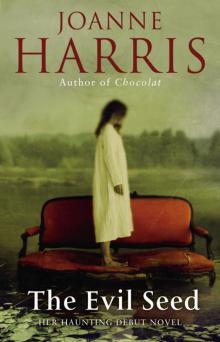 The Evil Seed
The Evil Seed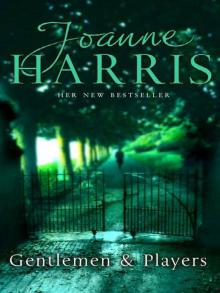 Gentlemen and Players
Gentlemen and Players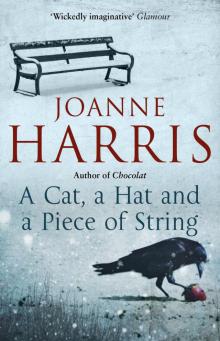 A Cat, a Hat, and a Piece of String
A Cat, a Hat, and a Piece of String Different Class
Different Class Chocolat
Chocolat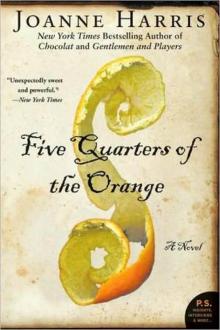 Five Quarters of the Orange: A Novel
Five Quarters of the Orange: A Novel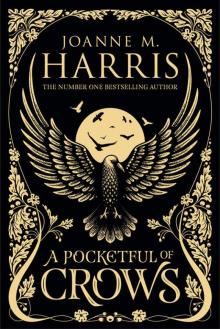 A Pocketful of Crows
A Pocketful of Crows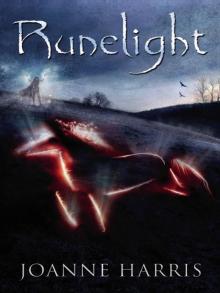 Runelight
Runelight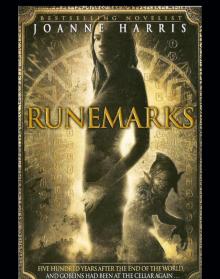 Runemarks
Runemarks Jigs & Reels: Stories
Jigs & Reels: Stories Sleep, Pale Sister
Sleep, Pale Sister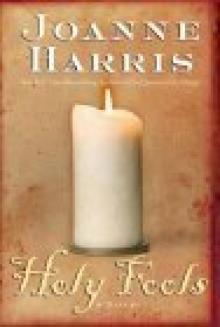 Holy Fools
Holy Fools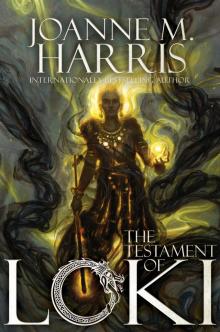 The Testament of Loki
The Testament of Loki Peaches for Monsieur Le Curé
Peaches for Monsieur Le Curé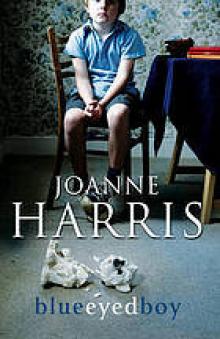 Blueeyedboy
Blueeyedboy The Lollipop Shoes
The Lollipop Shoes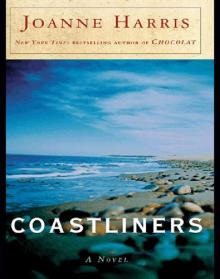 Coastliners
Coastliners Jigs & Reels
Jigs & Reels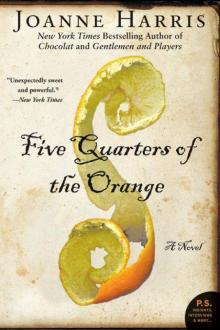 Five Quarters of the Orange
Five Quarters of the Orange